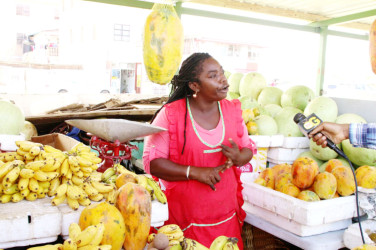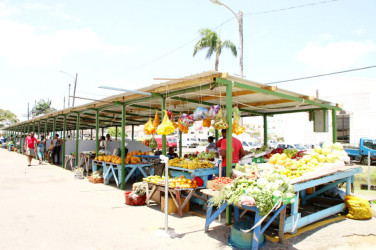Several vendors who ply their trade along the Merriman Mall have registered their dissatisfaction with the recent hike in rent imposed on them by the Georgetown Mayor and City Council (M&CC).
These complaints come two days after the M&CC issued a statement denying claims that there have been “rising concerns” by the vendors regarding the increased rates.
The statement read, “Despite reports from certain sections of the media claiming negative responses from operators of the Georgetown Municipal Wholesale Depot, the Mayor and City Council (M&CC) said that vendors gladly took the new $1,500 per day fee for them to ply their trade.”
The M&CC said it was unaware of what was being termed as “rising concerns” regarding the issue.

Town Clerk Royston King was also quoted as saying, “The vendors understand the significant upgrade the facility has received, as well as the added amenities they now have access to. The vendors were quite happy to pay the fees given the improvements we made them aware of. As far as we (Council) know, no one has registered any concern or complain about the matter. They did try to negotiate with us but after we explained things to them, they understood.”
However, a different tale was told by the vendors who contacted Stabroek News yesterday to register their complaints.
Stabroek News was made to understand that prior to being relocated vendors were told that the stalls would attract a weekly fee of $1,500, which they were okay with. They were, however, caught off guard during a meeting held last Monday where M&CC officials explained that the $1,500 fee would be collected on daily basis instead.
Owing to this, many have expressed dissatisfaction as the new rate is five times the fee they previously paid.
One vendor, Melissa Roberts, told Stabroek News that in addition to having to pay the increased amount, the MCC has barred vendors from storing produce in the stalls overnight. As a result of this, she like several others, are forced to pay additional costs for the transportation of goods to and from the market area.
Roberts, who transports her produce all the way from Victoria, East Coast Demerara said, “When we are finished paying all of our bills there, we still have to pay transportation to get here. I have to pay $10,000 bring these goods with a truck, then you got to pay them to take it back in the evenings. You got to find food to eat, water to drink; when we finished paying those things, how can we afford to pay the revenue that MC&C is asking for?
“I buy a basket of mango for $5,000, I sell it back and I only make $1,000 profit. I buy a bag of orange to resell but I’m only making $5 on an orange and that’s what I have to pay the revenue with.”

Similar sentiments were shared by Shah (only name given) and Deokie Persaud two other vendors who aired complaints during yesterday’s visit to the area.
Persaud stated that because of the increase she is only able to sell on three out of the four days that they are allowed to ply their trade at the Merriman Mall. She explained,
“It hard. It real hard cause sometimes the load [produce] ent finish and you have to pay another $1,500 on the same load. I sell here Wednesday, Thursday and Saturday, I can’t afford to sell here the four days; we have bills to pay at home, we have children to send to school.”
With the daily collection of $1500 being equivalent to $6000 a week, Shah related that it is “real hard” for small vendors like himself to come up with that money every day.
He went on to explain that although vendors are only allowed to start selling from 1 pm on Wednesday and from 3 pm on Fridays, they are still expected to pay the full $1,500 fee every day. Additionally, because vendors are not allowed to store the tables that they would normally use to display their produce in the stalls, they are forced to rent tables from the MCC at a cost of $500 per single table which is further compounded by the monies that are spent on transporting their produce to and from the market on a daily basis.
“Rich people don’t come out here and sell; rich people come out here and buy but those who are in need come out here and vend,” Shah said.
“The $1,500 a day is too much; me is a big old lady and me cyan afford that. Me in gat a husband, me in gat a son fuh give me nothing, is this me ah depend pon… I come up hay 4 o’clock and me still have to pay $1,500. Regardless of the day we come we still have to pay the $1,500,” one female vendor added.
Other issues raised included the rotation and sizes of the new stalls as well as the distance of washroom facilities and water supply from the Merriman’s Mall vending area.
The stalls are estimated to carry a measurement of six feet by eight feet, which, according to Roberts, is too small. “We have to pay $1,500 a day. The small space that Royston King gave us for $1,500 cannot work… When we are paying $1,500 a day, we don’t have a washroom, we don’t have pipes,” the woman lamented.
Stabroek News was made to understand that currently, the vendors source water from within the Bourda Market while the washroom facilitates are at Light Street, one corner away from where they are located.
Another vendor noted that the size of the stalls cannot accommodate the amount of produce that some vendors bring down to sell, before going on to explain that vendors are at risk of being fined a sum of $10,000 if they are caught displaying produce displayed beyond a specific point. Questions were also raised regarding the rotational occupancy system that is being utilized as it relates to the allocation of the stalls to vendors for daily use.
Roberts had explained that currently, vendors are asked to randomly pull stall numbers from a bag every day to find out which stalls they will be allowed to use.
“They ent even give you one permanent stall,” Shah said. Another vendor added, “One day yuh selling hay, another day yuh selling deh. They got you pulling number from bag…”
Meantime, the statement issued by MC&C stated that “while previously vendors had to remove all their items after a day’s work, this is no longer a burden to them. With the newly constructed stalls, vendors will not have to handle large trays and other equipment needed to display their produce.”
In the statement, the Town Clerk also said, “Our main concern is getting the vendors back to their location, while providing a clean, safe and comfortable environment for them to function.
This is a win-win situation for both sides. The improvements made to this location will eventually enable the council and the vendors together, to improve the service provided.”
He added that more would be done to improve the facility and one vendor related that once the stalls are equipped with electricity, they could a $500 increase on the current rent of $1,500.
In November, the M&CC asked those wholesalers who plied their trade in the area to move east and operate at what was once the “skating rink” to facilitate the creation of a car park to ease congestion in the city.
In January, the municipality announced that it had temporarily suspended vending operations along that strip and issued vendors a one-week deadline to get themselves in order.
It had said that the suspension was as a direct result of the Council’s observation that the area was very untidy, which was inconsistent with its vision to make Georgetown clean and green. Two days later, King told reporters that vending in the area would be permanently ended as the city “wants to give back this particular facility to the young people.” The entire strip between Cummings Street and Orange Walk, he had said, would be reserved for “cultural and social uses, such as open air concerts and sporting activities.”
When vendors turned up to sell on January 6, they found themselves barred from the site, with barricades manned by city police in place.
After protest by the displaced vendors and a statement from the President which said vendors must be provided with suitable spaces to operate while the City Council must also be able to enforce the city’s by-laws, King said that vendors would be allowed to resume selling in two weeks, on the condition that their operations are clean and environmentally-friendly.
He remarked that his previous statement about calling a permanent halt to vending should’ve clarified that the halt to vending would be for vendors who were not environmentally-friendly and not complying with the regulations in place to ensure the development of a green city.
At that time, King announced that the vendors who had been temporarily relocated to the stretch of mall between Light and Cummings streets could resume vending on January 20.
The city then constructed the current covered narrow stalls, which the vendors now occupy and which they have referred to as horse stables.





